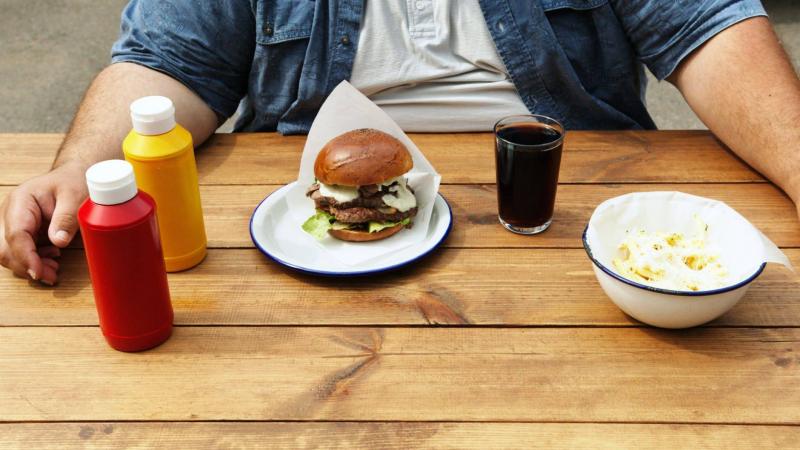Losing excess weight poses a challenge for many people, with the biggest hurdle being the ability to maintain the lost kilograms over a long period, according to the website "Eat This Not That." According to experts, the main reason some individuals struggle to lose weight is their pursuit of "quick fixes" that can yield dramatic short-term results but are not sustainable in the long run. Nutritionist Alison Herez states, "Always be wary of trendy diets and products that promise rapid weight loss in a short timeframe," explaining that "many trendy diets rely on very low-calorie meal plans. Due to the strict calorie restrictions, most [followers of these diets] will lose weight, but they also will not consume enough vitamins, minerals, and other nutrients. Thus, these 'magic bullets' can also be likened to yo-yo dieting, a system that research has shown ultimately leads to increased appetite and weight gain over time." Ashley Krautkramer, a certified nutritionist specializing in obesity and weight management, adds that weight loss products and supplements are not regulated or approved by the U.S. Food and Drug Administration (FDA), which means some may be hazardous to human health, warning that "if it seems too good to be true, it probably is."
### Adverse Effects and Gradual Weight Loss
Sarah Williams, a nutritionist, points out that not obtaining enough calories can actually lead to adverse effects, slowing the body's metabolism. She affirms that the slower the weight loss, the more likely it is to be maintained long-term. The U.S. Centers for Disease Control and Prevention (CDC) currently recommends gradual weight loss of 0.5 to 1 kg per week, a guideline that nutrition experts agree on, advising that adherence to these recommendations will likely lead to successful long-term weight maintenance.
1. **Slight Reduction in Calories**
Dr. Melissa Metri, a nutritionist, states that reducing calories by about 500 calories a day is a healthy standard for weight loss, noting that an adult female needs between 1600 to 2200 calories daily, while an adult male requires 2200 to 3000 calories, with the number of calories needed directly related to each individual's physical activity levels. Dr. Krautkramer advises that achieving the goal of reducing calorie intake by 500 calories a day can simply be done by replacing high-calorie foods with low-calorie alternatives and engaging in more physical activity.
2. **More Protein**
Dr. Metri says, "Protein helps boost metabolism and increases feelings of fullness, making it easier for a person to stick to a low-calorie diet. Therefore, every meal should include protein to support weight loss." However, Dr. Keith Thomas Ayou, an associate clinical professor at Albert Einstein College of Medicine, clarifies that there is variation among proteins and their sources, noting that "protein should be low-fat, and options like lean beef, skinless poultry, eggs, low-fat yogurt, shrimp, tuna, beans, and legumes are appropriate."
3. **Physical Activity**
Scientific and practical evidence has shown that weight loss requires consuming fewer calories than the calories burned, meaning that exercising more is effective. Once the target weight is achieved, the CDC recommends maintaining moderate-intensity exercise for 150 minutes per week, along with consistently modifying dietary habits.
4. **Proper Amounts of Water**
Drinking water is calorie-free, helps maintain metabolic quality and digestive health, and can contribute to feelings of fullness. Dr. Metri advises "drinking more water to help burn more calories, which can also assist in consuming less during meals." The U.S. National Academies of Sciences, Engineering, and Medicine recommends about 15.5 cups (equivalent to 3.7 liters) of fluids daily for men and 11.5 cups (about 2.7 liters) for women.
5. **Non-Starchy Vegetables**
Results from a 2019 study published in the American Journal of Clinical Nutrition indicate that increasing vegetable intake, particularly leafy greens, significantly contributes to body weight reduction, even among those with genetic risk factors for obesity. Nutritionist Lindsey DiSoto states that "non-starchy vegetables and fruits like spinach, green beans, cauliflower, and broccoli are nutrient-dense and promote feelings of fullness but do not have high calories that lead to weight gain, even when consumed in large amounts."
6. **Prioritize Fiber**
Dr. DiSoto explains that "it can be beneficial to focus on consuming more specific nutrients, as research shows that fiber-rich diets are associated with weight loss and adherence to dietary plans. Therefore, emphasis should be placed on fiber. While fiber does not provide a magic solution for weight loss, it is one of the best ways to enhance satiety and overall meal satisfaction, leading to reduced total calorie intake and weight loss." Dr. DiSoto recommends aiming for about 30 grams of fiber daily, gradually increasing the intake by about 2 to 3 grams each day.




